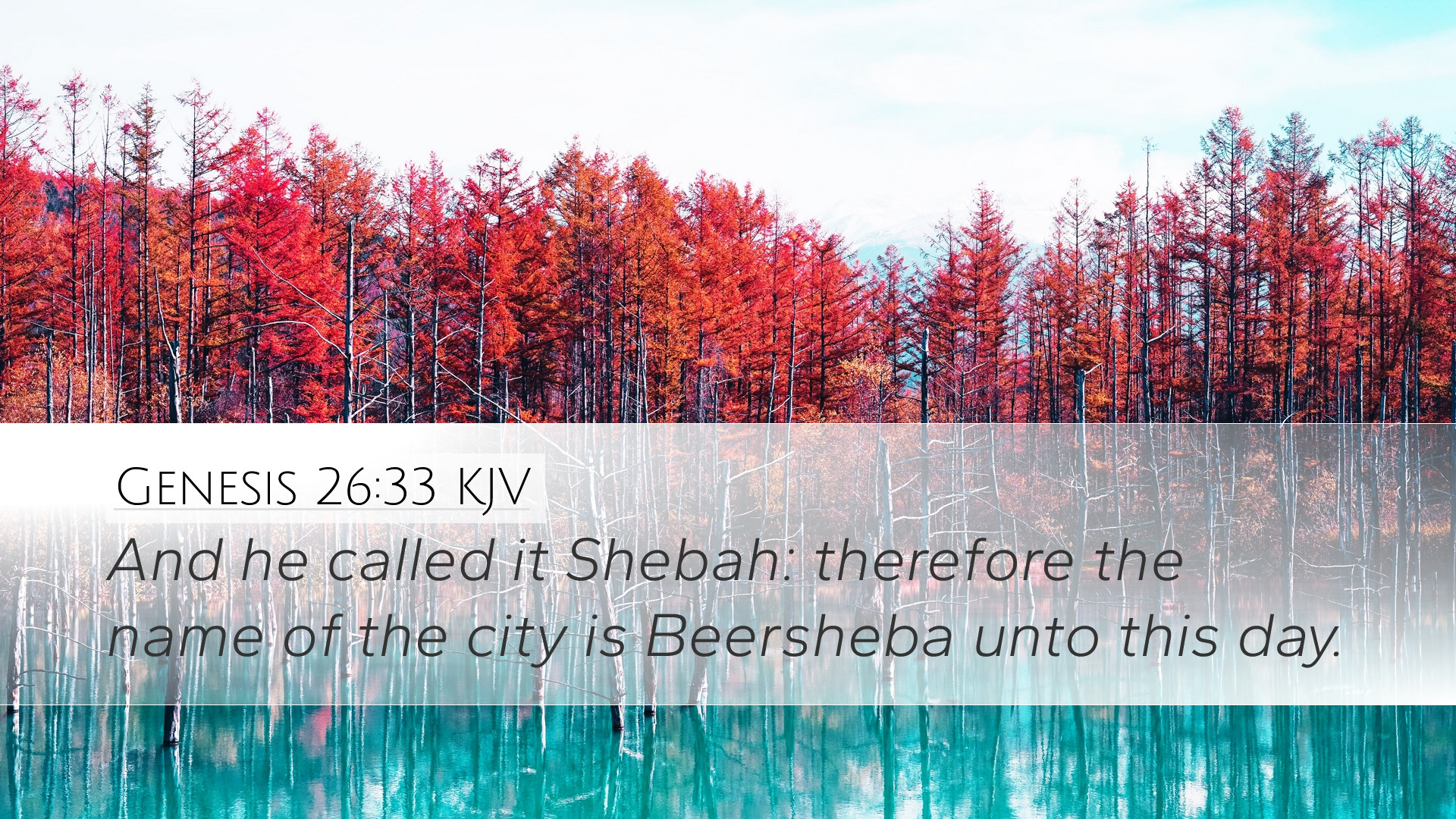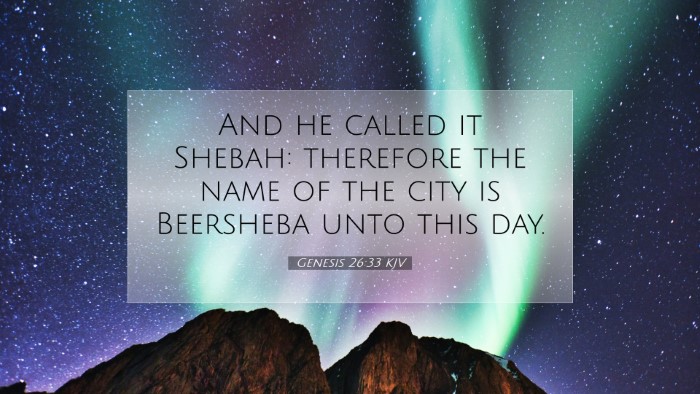Commentary on Genesis 26:33
Verse: "And he called it Shebah: therefore the name of the city is Beer-sheba unto this day."
Introduction
This verse marks a significant moment in the life of Isaac, the son of Abraham, highlighting themes of divine provision, covenant, and the establishment of identity through place. As we explore this verse through the lenses of various public domain commentaries, we will draw insights that can enhance the understanding for pastors, students, theologians, and Bible scholars.
The Context of Genesis 26
Genesis 26 recounts various events during Isaac's life, including his encounters with the Philistines, divine communication, and the reaffirmation of the Abrahamic covenant. In this chapter, we see how God continues to guide Isaac and fulfill His promises. Each of these events plays a role in forming the backdrop against which this verse is situated.
Historical Background
Isaac's experiences reflect God's ongoing relationship not just with him, but with humanity through covenantal promises initiated in Abraham. The setting in Gerar highlights the tension between Isaac’s family and the Philistines, showcasing the challenges faced by those who walk in faith.
Insights from Commentaries
Matthew Henry's Commentary
Matthew Henry emphasizes the significance of the well and the naming of Beer-sheba (meaning "well of the oath"). He points out that the well symbolizes both the physical sustenance that God provides and the spiritual oath that signifies God's commitment to His people. Henry suggests that the act of naming the well shows a recognition of God's providence and an establishment of identity through divine blessing.
Albert Barnes' Notes
Albert Barnes provides a detailed analysis of the name "Shebah," connecting it with the roots of the Hebrew word for "oath." He asserts that the well represents a covenantal relationship characterized by peace—a significant theme considering Isaac's previous disputes over water rights with the Philistines. Barnes notes that Beer-sheba becomes an emblem of God’s faithfulness and the prosperity that comes from keeping peace and honoring divine commitments.
Adam Clarke's Commentary
Adam Clarke offers insights into the broader biblical significance of Shebah. He points out the historical importance of Beer-sheba as a pivotal location in the story of the patriarchs, linking it to later events in Israel’s history. Clarke emphasizes the concept of wells as not merely physical resources, but as landmarks of faith and divine interaction. He notes that the naming also emphasizes Isaac's faithfulness in the face of adversity.
Thematic Interpretation
This verse serves as an anchor for several key themes in biblical theology:
- Divine Provision: The well symbolizes God’s provision, not just in terms of water but also spiritual sustenance. Throughout Scripture, wells often represent places of encounter with God.
- Covenant: The naming of the city underscores the significance of oaths in Israel's covenantal history. Here, Isaac reaffirms the promises made to Abraham, linking his identity to God's faithfulness.
- Identity and Heritage: Naming places in biblical tradition serves to establish identity. Beer-sheba becomes a placeholder in Israel’s narrative, marking not just a geographical point but a theological principle of belonging and continuity.
- Peace and Conflict Resolution: The resolution of the disputes over the wells reflects a deeper theological truth about the nature of God’s chosen people living in harmony with others, even when conflicts arise.
Application for Believers
Genesis 26:33 offers rich applications for the modern believer:
- Trust in Divine Provision: Just as God provided a well for Isaac, believers are encouraged to trust in God's providence in their own lives, recognizing that He knows their needs.
- Commitment to Peace: As Isaac worked to establish peace with the Philistines, Christians are called to uphold peace in their relationships, reflecting Christ's love and reconciliation.
- Celebrating Our Spiritual Heritage: The naming of Beer-sheba invites believers to reflect on their own spiritual heritage, recognizing the importance of the community of faith in the journey of discipleship.
- Language of Faith: The identifiers we use in our communities can reflect our faith commitment, leading us to establish places, practices, and principles that honor our relationship with God.
Conclusion
Genesis 26:33 encapsulates a pivotal moment in Isaac's life and the broader narrative of God's dealings with His people. The profound insights drawn from public domain commentaries illuminate the theological richness of this verse, encouraging believers to reflect on themes of provision, covenant, peace, and identity. In understanding these layers, pastors, students, theologians, and Bible scholars can deepen their engagement with Scripture and its implications for their faith journey.


